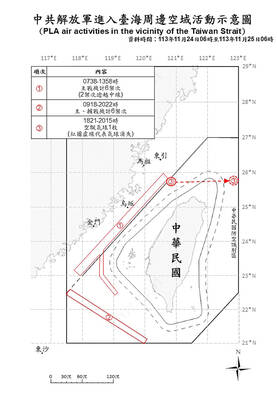A former senior US naval officer warned Monday that within 20 years, China will have the ability to wreak havoc on US naval forces going to Taiwan's defense against a Chinese attack.
Such a defeat of the US navy by a Chinese force "will ruin America as we know it today," Vice Admiral Al Konetzni said. He was testifying before a hearing of a commission formed by the Pentagon earlier this year to probe plans for closing dozens of US military bases in a bid to save money.
Konetzni was testifying at a hearing in Boston on plans to close the Naval Submarine Base in New London, Connecticut, one of 33 major bases slated for closure under the Defense Department's base closure initiative.
He made his comments less than a week after the Pentagon released its annual report to Congress on China's military buildup, which warned of a grave threat to Taiwan stemming from China's military modernization and of its submarine force expansion.
A key role for Chinese submarines, the report and US military experts note, would be to prevent the US from coming close enough to aid Taiwan by essentially closing off the Taiwan Strait to US vessels and troops, allowing China to complete its attack on Taiwan without US interference.
China's submarine force is larger than the US', and "in the year 2025, they'll have three times [as many as the US] at the rate we're doing business," Konetzni told the base closing commission hearing.
"I see a problem with Taiwan," he added.
"I see us putting our white hats on and going across the world and getting there" in the case of hostile Chinese military action against Taiwan requiring a US response, he said.
"And I see one punch in the nose, and it will ruin America as we know it today," Konetzni told the commission.
Until his recent retirement, Konetzni was the deputy commander of the naval command that covered Europe, the Atlantic and the Pacific. Before that he spent three years as commander of submarines in the Pacific and before that, three years in Japan and South Korea.
He testified in opposition to the closure of the New London submarine base.
There are 400 submarines in the world today, he said. China now has a larger force than the US' and in 10 years China will have twice as many submarines as the US. By 2025, the gap will rise to three-to-one, he testified.
Konetzni said that the US has fewer submarines in the Pacific than it has needed, even with the stationing of additional subs in Guam at the end of the 20th century.
"Today, we can deploy nine -- we can stretch it to 10 -- submarines at a time. Our [combat commanders] ... have a requirement for critical requirements of up to 13," he said.
"The fact is, over 30 percent of critical peacetime missions are missed annually. That means we didn't know much about the Chinese [or their] Yuan-class being launched last year," he said.
Ironically, the New London facility is one of the shipbuilding sites that could be involved in building the diesel subs that the Bush administration has been pressing Taiwan to purchase since 2001.
The Electric Boat Division of the defense contracting giant General Dynamic Corp has a variety of docks reserved for ship building, refitting and repair, which builds submarines for the US navy and for sale abroad under US official foreign arms sales programs.
General Dynamics has been named as a potential supplier of the eight submarines that are part of the NT$410.8 billion (US$12.8 billion) arms-sales package that has been held up in the legislature by the Chinese Nationalist Party (KMT) and its allies.

Taiwan’s passport ranked 34th in the world, with access to 141 visa-free destinations, according to the latest update to the Henley Passport Index released today. The index put together by Henley & Partners ranks 199 passports globally based on the number of destinations holders can access without a visa out of 227, and is updated monthly. The 141 visa-free destinations for Taiwanese passport holders are a slight decrease from last year, when holders had access to 145 destinations. Botswana and Columbia are among the countries that have recently ended visa-free status for Taiwanese after “bowing to pressure from the Chinese government,” the Ministry

Theaters and institutions in Taiwan have received 28 threatening e-mails, including bomb threats, since a documentary critical of China began being screened across the nation last month, the National Security Bureau said yesterday. The actions are part of China’s attempts to undermine Taiwan’s sovereignty, it said. State Organs (國有器官) documents allegations that Chinese government officials engage in organ harvesting and other illegal activities. From last month to Friday last week, 28 incidents have been reported of theaters or institutions receiving threats, including bomb and shooting threats, if they did not stop showing the documentary, the bureau said. Although the threats were not carried out,

HEALTHCARE: Following a 2022 Constitutional Court ruling, Taiwanese traveling overseas for six months would no longer be able to suspend their insurance Measures allowing people to suspend National Health Insurance (NHI) services if they plan to leave the country for six months would be abolished starting Dec. 23, NHIA Director-General Shih Chung-liang (石崇良) said yesterday. The decision followed the Constitutional Court’s ruling in 2022 that the regulation was unconstitutional and that it would invalidate the regulation automatically unless the NHIA amended it to conform with the Constitution. The agency would amend the regulations to remove the articles and sections that allow the suspension of NHI services, and also introduce provisional clauses for those who suspended their NHI services before Dec. 23, Shih said. According to

‘GRAY ZONE’ TACTICS: China continues to build up its military capacity while regularly deploying jets and warships around Taiwan, with the latest balloon spotted on Sunday The US is drawing up contingency plans for military deployments in Japan and the Philippines in case of a Taiwan emergency, Japan’s Kyodo news agency reported. They would be incorporated in a first joint operation plan to be formulated in December, Kyodo reported late on Sunday, citing sources familiar with Japan-US relations. A US Marine Corps regiment that possesses High Mobility Artillery Rocket Systems — a light multiple rocket launcher — would be deployed along the Nansei Island chain stretching from Kyushu to Yonaguni near Taiwan, Kyodo said. According to US military guidelines for dispatching marines in small formations to several locations,